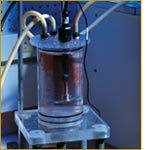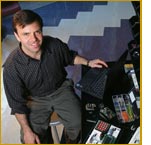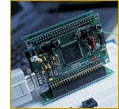

| Learning and Doing Go Hand in Hand Students looking to apply what they’ve learned in class through hands-on projects in the learning center don’t have to go very far. Professors are more than happy to present them with an engineering challenge to solve. A Lesson in Control  Most of the “challenges” come from departmental coursework
like the control experiment Hsueh-Chia Chang, Bayer
Professor of Chemical Engineering, developed for his students. Seniors
in Chang’s class
on chemical process and control were asked to design a controller for
a pH control project and then tune and monitor its functions. The learning
center helped Chang and his students test controller tuning theories
on a real system. “My students really appreciated being able to
put the theories they were learning into action,” he says. “Many
of them commented that working with a real system -- seeing the
fluctuations, monitoring gains, and learning not to over adjust the control
mechanism -- was invaluable.” Most of the “challenges” come from departmental coursework
like the control experiment Hsueh-Chia Chang, Bayer
Professor of Chemical Engineering, developed for his students. Seniors
in Chang’s class
on chemical process and control were asked to design a controller for
a pH control project and then tune and monitor its functions. The learning
center helped Chang and his students test controller tuning theories
on a real system. “My students really appreciated being able to
put the theories they were learning into action,” he says. “Many
of them commented that working with a real system -- seeing the
fluctuations, monitoring gains, and learning not to over adjust the control
mechanism -- was invaluable.”A Session on Microcontroller Interfacing  One of six learning center modules funded by the General Electric Fund,
the project designed by J. William Goodwine
Jr., assistant professor
of aerospace and mechanical engineering, and Michael
D. Lemmon, associate
professor of electrical engineering, works like a “mini course.” Students,
even faculty, can teach themselves about interfacing microcontrollers.
All Notre Dame engineering students are exposed to microcontroller concepts
in EG111 and 112, but the first-year course sequence doesn’t cover
a number of advanced topics essential for the successful design and development
of real-life embedded systems. Nor does it address the costs, benefits,
and risks associated with integrating microcontrollers into a variety
of systems. The multidisciplinary module takes about four hours to complete
and covers methods from electrical, computer, and mechanical engineering.
Topics include analog interfacing, interrupt synchronization, and embedded
system applications. In addition to being a unique individual course,
the module augments undergraduate control courses in both the electrical
engineering and aerospace and mechanical engineering departments. One of six learning center modules funded by the General Electric Fund,
the project designed by J. William Goodwine
Jr., assistant professor
of aerospace and mechanical engineering, and Michael
D. Lemmon, associate
professor of electrical engineering, works like a “mini course.” Students,
even faculty, can teach themselves about interfacing microcontrollers.
All Notre Dame engineering students are exposed to microcontroller concepts
in EG111 and 112, but the first-year course sequence doesn’t cover
a number of advanced topics essential for the successful design and development
of real-life embedded systems. Nor does it address the costs, benefits,
and risks associated with integrating microcontrollers into a variety
of systems. The multidisciplinary module takes about four hours to complete
and covers methods from electrical, computer, and mechanical engineering.
Topics include analog interfacing, interrupt synchronization, and embedded
system applications. In addition to being a unique individual course,
the module augments undergraduate control courses in both the electrical
engineering and aerospace and mechanical engineering departments.A Variety of Experiences  Multidisciplinary in nature, the GE Learning Modules have been integrated
into the course activities of several departments. The six modules developed
for the learning center include: Multidisciplinary in nature, the GE Learning Modules have been integrated
into the course activities of several departments. The six modules developed
for the learning center include:• Autonomous robots • Degradation of organic contaminants in groundwater • Embedded microcontrollers and microcontroller interfacing • Microelectromechanical systems (MEMS) • Remote sensing and data acquisition in microprocessor-based systems • Satellite communications |